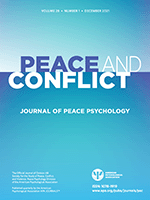-
15 May 2025 • Journal Article • Conflict Resolution Quarterly
Spontaneous Contact and Social Resilience Following Eruption of Interethnic Violence in Ethnically Mixed Settings
AbstractDoes spontaneous contact between individuals from different ethnonational groups affect their social resilience, specifically their ability to avoid escalation and radicalization following eruptions of ethnic violence? To address this question, we conducted a series of studies in mixed Jewish–Palestinian cities and academic settings. Study 1, based on data collected
… show more -
May 2025 • Journal Article • Peace and Conflict: Journal of Peace Psychology
Predictors of support for an Israeli–Arab regional agreement among the ultra-Orthodox Jewish–Israeli society
AbstractThis study focuses on a major sector in the Jewish–Israeli society that has a significant and growing influence on Israeli political and policy decisions: the ultra-Orthodox society. It investigates, within the context of the 2023–2025 Israel–Hamas war, factors explaining ultra-Orthodox Israeli–Jews support for a regional agreement that includes Israel, the Palestinians
… show more -
1 May 2025 • Journal Article • Convergence
Phonographic theatricality: The performativity of human-machine vocality
AbstractIntermingling new and old media, this article introduces the concept of phonographic theatricality to explore the performativity of human-machine vocality. It jointly discusses the theatricality of historical and new sound media: media principles that characterized the phonograph in its emergence are still evident in the speech of contemporary AI-voice agents. Phonographic
… show more -
30 Apr 2025 • Journal Article • New Media & Society
The high-tech elite? Assessing the values of tech-workers using the European Social Survey 2012–2020
AbstractUsing data from the 2012–2020 European Social Survey and Schwartz’s theory of basic values, this article maps the values of tech-workers, in order to assess and understand their uniqueness and homogeneity. Consistent with prior, mostly US-focused research, we find that European tech-workers hold a liberal worldview, which values openness to change, individualism, and
… show more -
29 Apr 2025 • Journal Article • The Information Society
What (missing) the smartphone means: Implications of the medium’s portable, personal, and prosthetic aspects in the deprivation experience of teenagers
AbstractThis deprivation study leverages the smartphone’s absence to understand its presence, exploring a one-week smartphone deprivation experience of 80 Israeli adolescents aged 13-18. The data was primarily qualitative, derived from field journals, interviews, and focus groups. However, the most important and least expected finding was quantitative: all participants but one
… show more -
28 Apr 2025 • Journal Article • Convergence: The International Journal of Research into New Media Technologies
The photographic palimpsest: Layering and alteration in digital photography
AbstractThis article offers a new framework for conceptualizing the digital photograph as a palimpsest – a multilayered signifying object representing various types and acts of alterations performed at different moments of an image’s formation. It offers an analysis of how the concept of layering is manifested within processes of alteration, and elaborates types of image
… show more -
23 Apr 2025 • Journal Article • Nature Communications
Factual knowledge can reduce attitude polarization
AbstractIt is commonly argued that factual knowledge about a political issue increases attitude polarization due to politically motivated reasoning. By this account, individuals ignore counter-attitudinal facts and direct their attention to pro-attitudinal facts; reject counter-attitudinal facts when directly confronted with them; and use pro-attitudinal facts to counterargue
… show more -
21 Apr 2025 • Journal Article
But There Was Love: Shaping the Memory of the Shoah
AbstractBut There Was Love—Shaping the Memory of the Shoah proposes a new paradigm for Shoah remembrance in today’s cultural and political reality. It derives from the four-year workings of a group of researchers and artists at The Van Leer Jerusalem Institute led by Michal Govrin. The group positions the extraordinary Jewish and non-Jewish human struggle in facing dehumanization
… show more -
18 Apr 2025 • Journal Article • Historical Journal of Film, Radio and Television
Framing Contagious Images: The Formation of Early Holocaust Memory through Migrating Film Footage from the Nazi Era
AbstractThis article examines how Nazi-era film footage shaped Holocaust memory in post-war German film documentaries. From the mid-1950s, filmmakers began using previously unreleased archival footage to document the persecution of European Jews, a subject that had been largely suppressed until then. These films often relied on unpublished records from propaganda units, soldiers
… show more -
7 Apr 2025 • Book Chapter • The Intellect Handbook of Documentary
Wang Bing's Documentary Po/ethics of the Maoist Chaos and the Paradigm of Western Testimony: Unwitnessing, Victims, Collaborators, Followers, Cadres and Dissidents
AbstractThis essay aims, first, to expose the failure of post-Holocaust cinema, as well as Western trauma and genocide research on the Age of Testimony, to take into consideration non-Western survivors' accounts of twentieth century's collective traumas. Second, and consequently, it aims to analyze Chinese independent director Wang Bing's 2007-2018 (mostly documentary) hexaptych
… show more





















